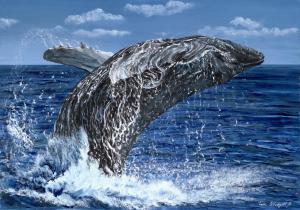Sale on canvas prints! Use code ABCXYZ at checkout for a special discount!

This may sound extreme, but itís increasingly becoming reality. The current rate of acidification of the ocean is ten times the rate that preceded the mass extinction 55 million years ago.[i] Itís hard to find a beach that doesnít contain plastic debris, some of which has already passed through some organism, causing its demise.
Rising pH levels in the ocean are due to carbon dioxide being absorbed into the ocean, creating carbonic acid. This affects every living organism in the ocean, from oysters and coral, struggling to build their shells and skeletons, to krill and phytoplankton, perishing from increasing ocean temperatures. The delicate interdependency of the food web means that no organism is unaffected.
Whether small or large, any impact that we have on the earthís delicate climate rhythms only serves to display our unwillingness to respect the need to work and grow in concert with nature. We have the capability, but our current infrastructure is designed to perpetuate the use of the coal for hundreds of years. As a result, recognizing the invaluable damage we are doing to the biosphere and its animals which support us may be clouded by the value of more immediate cheap energy. Marinella and I are no different than anyone else. We struggle with what choices are economically feasible in the interest of preserving the environment all the time. But struggle we must.
The countless marine life that ingest small pieces of broken down plastic certainly struggle. According to the U.N. Secretary, more than 100 thousand mammals and sea turtles, and more than 1 million seabirds are killed each year from trash. The San Diego Coastkeeper, a non-profit, found that plastics in the ocean outnumber zooplankton 6:1.
Imagine the pain associated with damaged and blocked insides due to plastic and chemical ingestion. Now imagine that organism being caught and cleaned prior to death, nicely prepared in a plastic container for you to take home and eat after a long day at work, along with the pollutants that have made their way up the food chain.
If you would like a Fine Art Print of the Humpback Whale, please click here:
10% of net profit is donated to wildlife and habitat conservation.
--------------------------------------------------------------------------------
[i] Yale Environment 360. An Ominous Warning on the Effects of Ocean Acidification